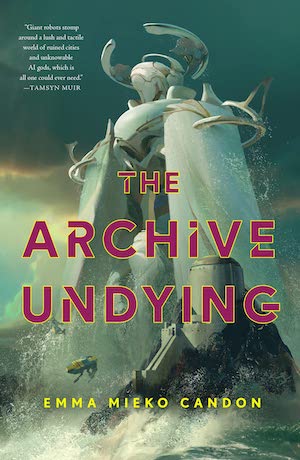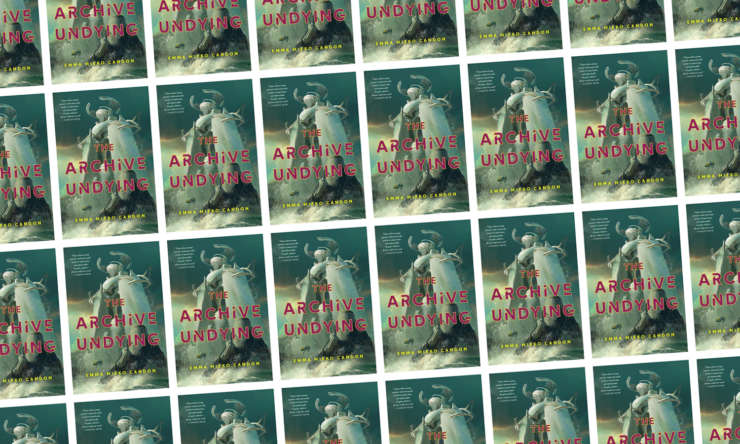If you have been looking for a new disaster baby to love, let me introduce you to Sunai. He hasn’t aged since he first died, seventeen years ago; his body has, as he puts it, a persistent case of life. In order to forget the things that led to his death, Sunai indulges in casual sex and copious drinking (or is it the other way around?). The full depths of his debauchery you’ll have to take for granted, though, as shortly after Emma Mieko Candon introduces this endearingly louche youngish man, he finds himself semi-kidnapped into a job he didn’t want, working for people he doesn’t want to be near, and maybe headed the last place he wants to go.
The hangover isn’t helping, either.
Sunai’s tale begins with a brief and disconcerting introductory chapter in which he dies, and shares his consciousness, and another person seems to narrate, and all of this sets the stage for the rest of Candon’s story, which is concerned with bodies and family and friends and lovers and gods and the way all of these things might support or betray us, sometimes at the same time.
Buy the Book


The Archive Undying
It’s also a road trip, a history with missing pieces, and a most unusual love story of several different kinds. (Rarely have I seen a character employ cooking so delightfully as Sunai does.) Sunai’s world is, or was, overseen by massive autonomous intelligences that once supported city-states. Almost all have fallen to corruption, barring the wonderfully named Fun-Sized Exultation in Perpetuity. But once they were like gods, and yet are not the only religion in this world, where Sunai thinks often of the Lay, a book of stories with multiple interpretations. (The frequently employed curse “God’s eternal dick” also raises questions.) How all these things relate, exactly, must be a story for another time.
Corrupted intelligences wreak havoc on their people and their places—violent, ugly, deadly havoc. Sunai survived the corruption of the intelligence known as Iterate Fractal, with whom he was connected when it died. He died, but then, he didn’t stay dead. The story he finds himself in, after the strange (and attractive) Dr. Veyadi Lut sweeps him off on an unwanted adventure, involves what’s left of Iterate Fractal, the origins of corruption, the power struggles between the dominant Harbor and smaller factions, and many figures from Sunai’s checkered past, not all of whom have always been kind to him.
Condon writes Sunai with a lovingly wry tone that is catnip for those of us who like our protagonists messy and yet drawn, in spite of what’s left of their sense of self-preservation, toward doing the right thing—though Sunai can rarely do the right thing without berating himself for all the reasons it’s stupid and dangerous and pigheaded to do so. He’s usually right on both fronts: Things need doing, dangerous and foolish and dramatic things, and he’d have an easier time of it if he ran the other way. But this isn’t really a character who’s looking for easy, no matter how big a game he talks about getting wasted and getting laid at any opportunity. He has a fraught relationship with his undying body, and those are ways of exerting control over it. Good ways? Debatable. But still: control.
The Archive Undying is immersive and glorious, and yet in some ways a frustrating read. Words don’t always mean what you expect them to, and the story is sometimes fast and loose with context. The world is so densely, incredibly imagined, and tugs the reader along so swiftly, that it can sometimes feel like The Archive Undying is the second book in a series that skipped the first.
Candon has imagined this place from nose to toes, from the tops of the towering mechanical ENGINEs to the slimmest connection between AI and relic and supplicant. But to a reader entering it for the first time, it feels elusive. I have never in my life wanted a prologue so badly: an introduction, a brief history, a stage-setting for these autonomous intelligences; a little more about the Cradle and the ominous Immaculate Empire and all the other references that I can’t catch because I simply don’t have enough context. A map would be incredible, too: This is a world that wants to be seen.
Not every reader will be frustrated by this, and it’s not an insurmountable hurdle. You just have to be willing to be lost for a time amid the ruins and coral and city-states and frags. A few days after I finished the book, I reread the first few chapters and found it a much smoother read. It’s a dizzying world, and there’s clearly so much more for Candon to show us.
What they have mastered is an incredible way with perspective, with shifting voices and shifty personhood. Along the way, Sunai acquires what he refers to as his passenger, a voice (sort of) in his head (and occasionally talking to itself) he can’t identify. But it shares his mind and therefore his body, and it’s not the only consciousness to intrude on Sunai’s self before the story is over. What a person is, and how that relates to the place, the body, it calls home—these things tangle like the tendrils and branching coral of Candon’s powerful AIs.
There’s a level of body horror, but there’s also a level of body curiosity. Sunai can’t die, but is troubled by a bad ankle, a reminder that once altered, a body is never exactly the same. The AI may have giant robot bodies, but those are piloted by humans. (It’s not Pacific Rim, but there are big robot fights and the specific intensity of drift-compatibility. Sort of.) What is a body if you’re just a mind? What can be a body? How does what happens to a body affect the mind that calls it home?
And Sunai’s not the only one with body/mind issues; Veyadi Lut wears a high-tech visor for reasons that gradually become clear, and when another member of their party is injured and needs help getting around, Candon depicts their reaction, and those of their peers, with a realistic mix of uncertainty and acceptance. Acceptance flows throughout this story, in which queer love and a variety of genders are entirely normal, and the world (at least the less fascist parts of it) seems to be run by a bevy of aunties, all of whom know much more than they’re letting on.
If you are a big mecha fan, The Archive Undying is probably a very different reading experience. But you don’t need to be one. Sunai is a magnetic, impossible character, and everything else follows in his wake (which probably smells like curry and faded cigarette smoke, with a hint of cheap hooch). Unexpectedly, the novel reminded me at times of Alaya Dawn Johnson’s The Library of Broken Worlds, which also features unknowable intelligences with which characters physically commune, which also sometimes build with bone and coral. But this novel is that one’s tipsy older sibling, well past coming of age, still putting off coming into adulthood. Transformative, lush, and dizzying, it’s an auspicious start to an intriguing series.
The Archive Undying is published by Tordotcom Publishing.
Read an excerpt.
Molly Templeton lives and writes in Oregon, and spends as much time as possible in the woods. Sometimes she talks about books on Twitter.










